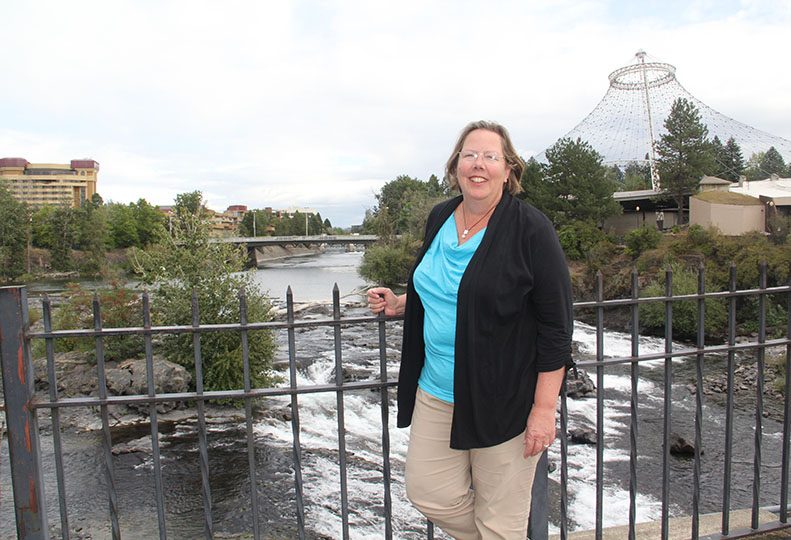
Home » Lawyer navigates guardian role for rivers, water rights
Lawyer navigates guardian role for rivers, water rights
Paschal Osborn champions conservation, resource management

September 26, 2013
Spokane lawyer Rachael Paschal Osborn has spent the last two decades fighting for a resource many of us take for granted every day—water—and she says she expects over time to intensify her advocacy efforts.
Osborn is the senior policy adviser, co-founder, and former executive director for the Center for Environmental Law and Policy, based in Seattle. She is also the litigation chairwoman for the Washington state branch of the Sierra Club and an adjunct faculty member at the Gonzaga University School of Law.
In general, she describes herself as a public-interest water attorney and advocate for nonprofit organizations. She works from her historic west Spokane home.
Osborn is part of an ongoing Sierra Club and CELP lawsuit challenging the U.S. Environmental Protection Agency and Washington state Department of Ecology for allegedly failing to clean up polychlorinated biphenyls, or PCB, pollution in the Spokane River. Osborn is the Sierra Club's coordinator for the Spokane River Project, meaning she advocates with local government and assists in deciding when and whether to bring lawsuits involving the river.
She also is working on a continuing CELP case that involves the Enloe Dam, which is located on the Similkameen River near Oroville, Wash., just south of the U.S.-Canada border. The dam, she says, hasn't been used to generate electricity since 1959. Officials at the state Department of Ecology had accepted in July a plan proposed by the Okanogan Public Utility District for a hydroelectric plant at the dam site. The plan, Osborn says, would drastically reduce the water level of the river below the dam.
CELP, along with other national, local, and Okanogan County public-interest organizations, appealed the decision and recently were successful in challenging the license for the hydroelectric plant, Osborn says.
"No agency should be issuing any kind of permit that takes water out of the river," she asserts. "We won this on a legal level; now we make sure the agency goes back in and does it right."
For the future, Osborn is slowly transitioning out of private practice and into a full-time advocate role, she says, but will continue to work as a liason for CELP and the Sierra Club. She also is involved in the upcoming 2014 renegotiation of the Columbia River Treaty, an agreement between Canada and the state of Washington about hydropower and flood management in the river. Osborn is part of a team of activists and lawyers who are attempting to have ecological restoration added as a third and equal co-purpose.
"This is a once-in-a-lifetime opportunity to improve how the Columbia River is managed," she says.
Osborn graduated from the University of Washington with a bachelor's degree in environmental studies. Although her interest in water and tribal law sparked while in college, her general passion for the environment began much earlier.
"My original environmental awakening occurred in 1969 when I was 13 and there was a big oil spill in Santa Barbara," she says "I lived in California at the time. It was one of the first televised environmental disasters and it really affected me, especially to see the animals."
While an undergraduate, Osborn encountered several water law and policy issues that fascinated her.
"I decided to go to law school specifically to study water law," she says.
While a law student, also at UW, Osborn met law professor Ralph Johnson, who taught water law and federal Indian law classes. Osborn and Johnson developed a student-mentor relationship.
"I was able to study and work with him, and he really helped guide my career," Osborn says.
Johnson, who began teaching at UW in 1955 and passed away in 1999, taught courses in federal Indian law before such courses were offered commonly in law schools. Johnson, Osborn says, worked with some tribes as an adviser on national resource issues. Once she graduated from law school in 1991, Johnson contacted Osborn with her first job offer to work for the Yakama Nation.
Tribal law, Osborn says, intersects with water law because tribes often have water or fishing rights in a river or lake. If the water source is threatened, the fish are threatened as well. In such a case, a tribe might bring legal action to ensure there is enough water to sustain fish.
Osborn co-founded CELP in 1993 and served as the executive director until 1999. CELP is a water advocacy group that focuses on water resource management and conservation efforts. It also, Osborn says, helps activists in other parts of the country with law issues.
"CELP has a program called Water Rights 911," she says. "Activists who encounter legal problems can contact CELP and we help them with whatever they're working on. It's very rewarding."
Osborn came to Spokane in 1999 to marry her husband, John. Currently, she is teaching a water law course at Gonzaga University. In the spring, she says, she'll be teaching environmental law. Osborn says her interest in teaching can also be credited to Johnson.
"He gave me some insight into how interesting teaching can be, and once I did it, I loved it," she says. "It's fun to work with students and it keeps you on your toes."
When asked what everyone should do in daily life to help conserve and protect water resources, Osborn says it's important to be conscious of the issues.
"I think awareness is the first step. There's a lack of recognition in Spokane and Eastern Washington that we have a water scarcity problem," she says. "When people look at a river, it looks like there's plenty of water, but when you calculate nature's needs, it really drops how much water you can take out before doing damage to the river."
Up Close
Related Articles




_web.jpg?1743064725)